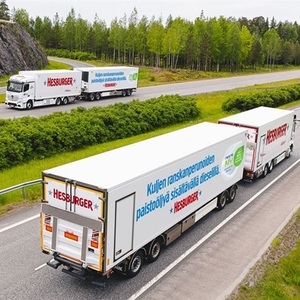Neste to source used cooking oil from Hesburger restaurants

October 19, 2021
BY Neste
Neste and Hesburger, a Finnish restaurant chain, will engage in a significant circular economy collaboration. Used cooking oil from more than 300 Hesburger restaurants in Finland and in the Baltics will be recycled to produce renewable diesel. As a result of the collaboration, Hesburger will begin using Neste MY Renewable Diesel in the majority of its transport vehicles in Finland, reducing the greenhouse gas emissions in these transports by up to 90 percent compared to fossil diesel use.
“We reduce our emissions by investing in plant protein products and energy efficiency, and by planning our transports effectively. Recycling and the circular economy have also been important focal points in the development of our activities, and this circular economy collaboration with Neste is a perfect match with our aims. Every year, our restaurants in Finland, Estonia, Latvia and Lithuania produce up to 420 tons of used cooking oil which is collected and transported as ecologically as possible. Neste uses the cooking oil and other renewable waste and residue raw materials to produce renewable diesel to be used also in Hesburger’s trucks. As the used cooking oil is collected by trucks delivering goods to the restaurants, it will not result in extra mileage,” says Heini Santos, communications manager at Hesburger.
Hesburger’s transportation vehicles that will begin using Neste’s renewable diesel travel annually a total of roughly 680,000 kilometers. By replacing fossil diesel with Neste’s renewable diesel, the amount of annually reduced greenhouse gas emissions compares to removing as many as 350 private cars from Finland’s roads for one year.
Advertisement
Only 6 percent of Finns consider climate actions easy outside their own home
Advertisement
In September 2021, Neste and Hesburger conducted a consumer survey on climate actions of 1,000 people in Finland. A total of 52 percent of the respondents considered everyday actions related to the climate to be easier in matters related to their own home and living. Outside the home – when moving, traveling or eating at a restaurant, for example – climate actions are considered to be much more difficult. 65% of the respondents felt that companies and consumers share the responsibility for climate actions.
“Concrete actions and close collaborations between companies are needed to combat climate change. This circularity collaboration with Hesburger is a concrete example of how collaboration can improve sustainability. At the same time, our climate action creates value for consumers visiting Hesburger restaurants, as the cooking oil used in making their French fries can be reused as a raw material for renewable diesel to reduce transportation emissions. In this way, we can provide consumers with an opportunity to make more responsible everyday purchasing decisions in Finland and in the Baltic region,” says Heidi Peltonen, team lead for sustainable partnerships in marketing and services at Neste.
Related Stories
The USDA maintained its outlook for 2025-’26 soybean oil use in biofuel production in its latest World Agricultural Supply and Demand Estimates report, released Aug. 12. The forecast for soybean oil prices was also unchanged.
U.S. soybean production for 2025 is forecast at 4.29 billion bushels, down 2% when compared to last year, according to the USDA National Agricultural Statistics Service’s latest monthly Crop Production report, released Aug. 12.
Marathon Petroleum Corp. on Aug. 5 released second quarter financial results, reporting improved EBITDA for its renewable diesel segment. The company primarily attributed the improvement to increased utilization and higher margins.
Chevron Corp. on Aug. 1 confirmed the company started production at the Geismar renewable diesel plant in Louisiana during the second quarter after completing work to expand plant capacity from 7,000 to 22,000 barrels per day.
California’s new specified source feedstock attestation requirement: A critical new compliance step for renewable fuel producers
As of July 2025, California’s SCFS requires renewable fuel producers using specified source feedstocks to secure attestation letters reaching back to the point of origin. This marks a significant shift in compliance expectations.
Upcoming Events










